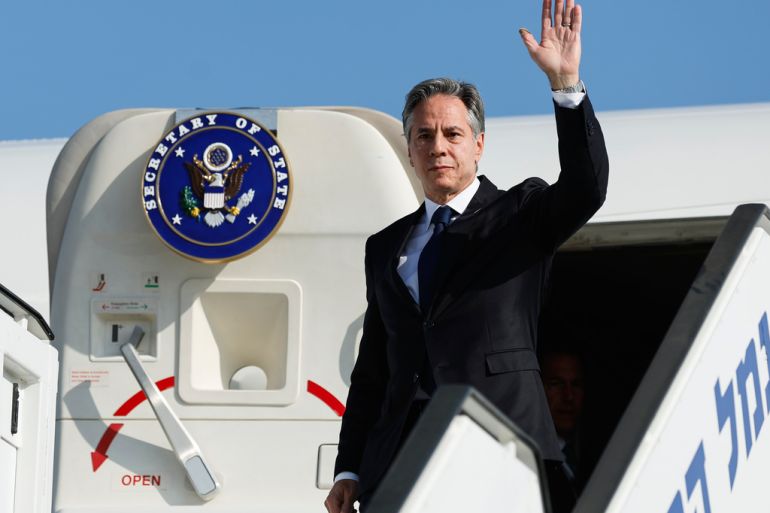Netanyahu resists pressure for ‘humanitarian pauses’ after Blinken meeting
US Secretary of State Antony Blinken says he discussed need to avoid civilian casualties with Israeli leader Netanyahu.

Israeli Prime Minister Benjamin Netanyahu has ruled out any temporary ceasefire in Gaza until Hamas releases its more than 240 captives, pushing back against US pressure for “humanitarian pauses” to protect civilians and allow aid into the besieged enclave.
US Secretary of State Antony Blinken arrived in Israel on Friday to call for steps to protect civilians and allow greater aid into Gaza, as Israeli troops encircled the enclave’s main city after several days of intensifying ground operations.
Keep reading
list of 3 items‘Unsafe in own home’: Israeli settlers spread terror in South Hebron Hills
Israeli families bring genocide complaint against Hamas to ICC
“A number of legitimate questions were raised in our discussions today, including how to use any period of pause to maximise the flow of humanitarian assistance, how to connect the pause to the release of hostages, how to ensure that Hamas doesn’t use these pauses or arrangements to its own advantage,” the top US diplomat told journalists.
Speaking shortly after Blinken, Netanyahu rejected the idea of a “temporary truce” until Hamas releases all of the more than 240 people taken captive on October 7, a group that includes Israeli soldiers and civilians, as well as foreigners.
“I made clear that we are continuing full force and that Israel refuses a temporary ceasefire which does not include the release of our hostages,” Netanyahu said in a televised statement.
After arriving in Israel on Friday, the first stop in a trip to the region, Blinken emphasised US support for Israel but asked for steps to protect civilians and allow greater aid into Gaza.
“We believe that each of these efforts [to protect Palestinian civilians and increase aid into Gaza] would be facilitated by humanitarian pauses, by arrangements on the ground that increase security for civilians and permit the more effective and sustained delivery of humanitarian assistance,” the top US diplomat told journalists.
Blinken’s visit came as Israel’s military surrounded Gaza City after expanding ground operations in the enclave, where it has pledged to dismantle the Palestinian armed group Hamas after a deadly attack on October 7 that Israel has said killed more than 1,400 people.
Met with @IsraeliPM Netanyahu and reiterated the United States’ support for Israel’s right to self defense and reaffirmed our commitment to a two-state solution. pic.twitter.com/dFKgllDqNj
— Secretary Antony Blinken (@SecBlinken) November 3, 2023
That attack, which included the mass killing of civilians, among them women and children, has been widely condemned by global leaders and international organisations.
But criticism of Israel’s response has mounted as its forces have cut off access to food, fuel and electricity for Gaza’s more than 2.3 million residents and levelled entire neighbourhoods with relentless air raids.
Palestinian authorities have said that more than 9,227 people, many of them women and children, have been killed by the constant bombardment, combined with strained fuel supplies from Israel’s siege to overwhelm Gaza’s already fragile health care system.
Aid agencies and international groups have warned that a humanitarian catastrophe is unfolding, and Palestinians in the besieged enclave have few options for seeking refuge.
Israel had instructed the population of Gaza’s northern regions to move south, but no corner of the Strip has been spared from the attacks.
”Never have I been in a situation where we are effectively starved of the vital humanitarian supplies that we need to provide to people,” said Tom White, director of the UN agency on Palestinian refugees, adding that most Palestinians in Gaza were surviving on one or two pieces of bread per day.
Speaking with members of the United Nations on Friday, UN aid chief Martin Griffiths said that there has been “some progress” on negotiations to allow additional fuel into Gaza.
“If we do not have pauses, we will not keep up with the needs of the people of Gaza and the Israelis also caught up in those areas of conflict,” he said.
While the United States has continued to pledge full support for Israel and rejected growing calls for a ceasefire, it has started to temper those statements with discussion about the need to protect Palestinian civilians and allow aid into Gaza as the death toll mounts.
Blinken and US President Joe Biden have both voiced support for pauses in the fighting to help facilitate the flow of humanitarian assistance, but Israel has firmly rejected those calls so far.
Blinken said he also told Netanyahu the US wants to see Israel take concrete steps to crack down on increasing attacks on Palestinians by Israeli settlers in the occupied West Bank, where 132 Palestinians have been killed by Israeli soldiers and settlers since the fighting began.